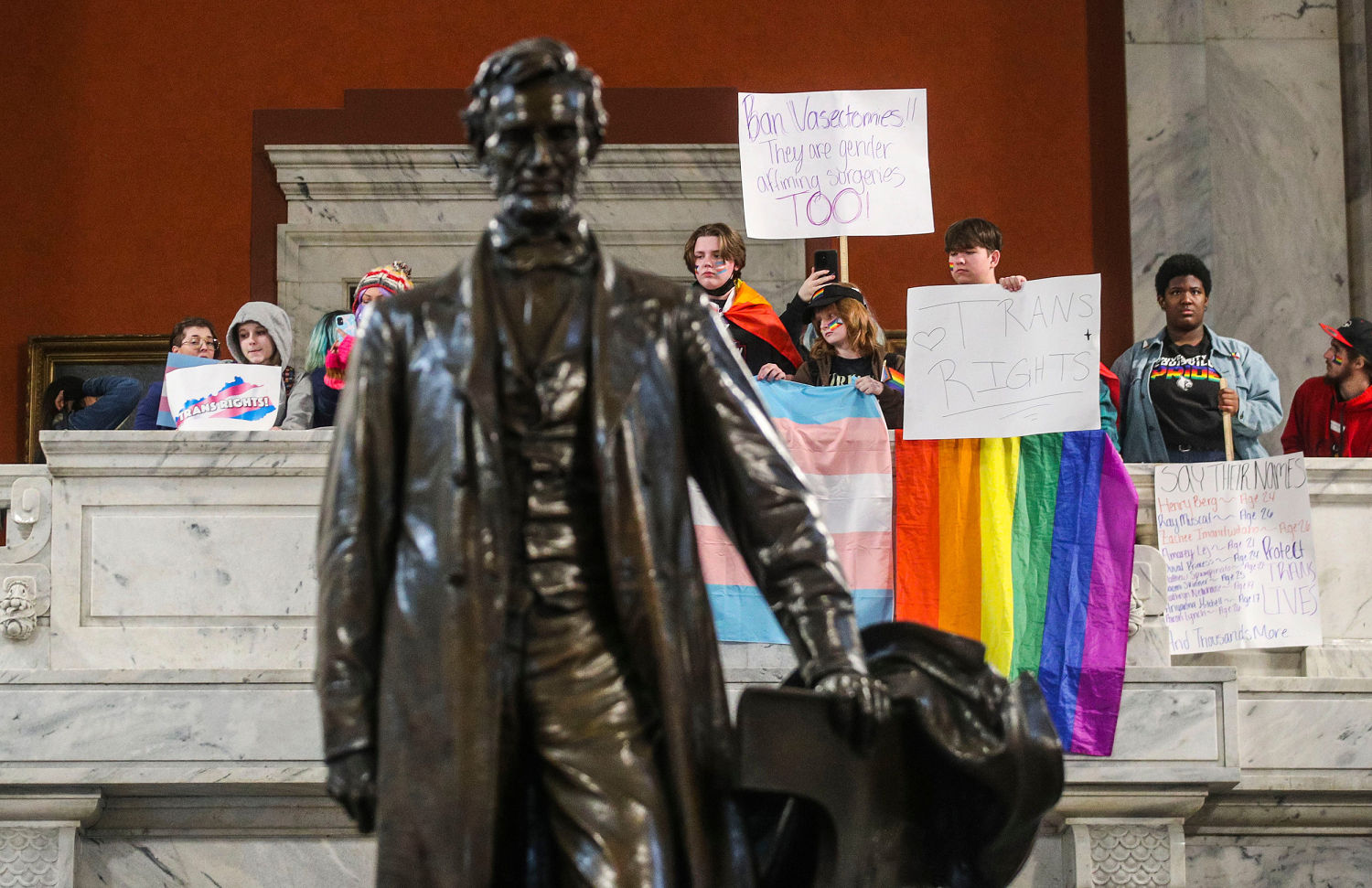Share this @internewscast.com

Republican-led state legislatures are considering a new round of bills restricting medical care for transgender youths — and in some cases, adults — returning to the issue the year after a wave of high-profile bills became law and sparked lawsuits.
As legislatures begin their work for the year, lawmakers in several states have proposed enacting or strengthening restrictions on puberty-blocking drugs and hormone treatments for minors. Bills to govern the pronouns kids can use at school, which sports teams students can play on, and the bathrooms they can use are back, as well, along with efforts to restrict drag performances and some books and school curriculums.
LGBTQ advocates say that most of the states inclined to pass bans on gender-affirming care have done so, and that they now expect them to build on those restrictions and expand them to include adults. With legislatures in most states up for election this year, transgender youths and their families worry about again being targeted by conservatives using them as a wedge issue.
They include Mandy Wong, a mother in Santa Barbara, California, who said she’s tired of conservative politicians using transgender children as “campaign fuel.” While she doesn’t expect such a policy to pass in her Democrat-led state, Wong said, her child and his friends feel emotionally drained.
“It was just heartbreaking to tell him … I don’t think this is going away anytime soon,” she said. “All the negative attention trans kids, even us as parents, have gotten because of these proposals doesn’t seem to be dying down.”
In Ohio, House Republicans voted Wednesday to override Republican Gov. Mike DeWine’s veto of legislation banning all forms of gender-affirming care for minors. The Senate is expected to follow suit this month. Despite his veto, DeWine signed an order banning the rare occurrence of gender-transition surgeries before adulthood. He also proposed rules mandating a care team for children and adults that critics say could severely restrict access for all patients.
In South Carolina, one of the few Southern states without a ban on gender-affirming care for minors, a House committee voted Wednesday to send a ban to the House floor. The bill, sponsored by the state’s Republican House speaker, would also prevent Medicaid from covering such treatments for anyone under age 26. And last week in New Hampshire, the House voted to ban gender-transition surgeries for minors.
At least 22 states have enacted bans on gender-affirming care for children, with most of them approved in the past year. Those who support the bans say they want to protect children and have concerns about the treatments themselves. Major medical groups, including the American Medical Association and the American Academy of Pediatrics, oppose the bans and have endorsed such care, saying it’s safe when administered properly.
Last year’s limits included a Florida law that has made it nearly impossible for many transgender adults in the state to receive gender-affirming care. Florida Gov. Ron DeSantis has promoted that ban as one of his accomplishments as he seeks the Republican presidential nomination.
“They’ll stop at nothing, so we don’t know what exactly to anticipate (in 2024),” said Katy Erker-Lynch, executive director of PROMO, an advocacy group in Missouri, where lawmakers have proposed more than 20 bills targeting LGBTQ+ people.
Bills filed in Missouri include efforts to remove two provisions that were key in overcoming a Democratic filibuster to that state’s ban on gender-affirming care for youths. The new Missouri Freedom Caucus is prioritizing a bill that would make the ban on gender-affirming care for minors permanent, removing a provision that allows it to expire in 2027. Legislation would also remove a clause that allows minors who began the care before the law went into effect to continue with it.
Republican state Sen. Mike Moon, who is sponsoring bills both to repeal the expiration date on the medical restrictions and to require schools to tell parents if a student wants to go by a name or pronoun other than the one the parent used to register the child for school, compared transgender medical restrictions for minors to age thresholds in laws for smoking, drinking and driving.
“Children, especially younger children, don’t make good decisions, and they’re not certain exactly what reality is sometimes,” Moon said.
LGBTQ+ activists call laws that require schools to tell parents about a student’s desire to change names or pronouns “forced outing,” saying schools might be the only safe place for a transgender or nonbinary student to express their gender identify.
Missouri’s large number of filed bills has drawn attention from activists, but Republican legislative leaders say they don’t think there’s much of an appetite for revisiting the restrictions and don’t want to prioritize them.
“We passed what I thought was a strong and fairly broad bill last year,” said Missouri Senate President Pro Tem Caleb Rowden, referring to the medical ban.
In Oklahoma, at least two bills remain active from last year that target gender-affirming care for adults. One proposal would prohibit insurance coverage for the procedures for adults, while another would prohibit public funds from going to any entity that provides such care.
Both measures stalled in the Republican-controlled Legislature last year but could be reconsidered during the legislative session starting in February.
The rules proposed in Ohio by DeWine last week place new limits on adults that advocates say would make treatment difficult, if not impossible, for some people. They include mandating a team for individuals that would consist of at least an endocrinologist, a bioethicist and a psychiatrist. The rules also would require departments to collect data submitted by medical providers on gender dysphoria and subsequent treatment.
Several bills have been filed in Florida, including a measure to require employees at state agencies or at any entity that receives state funding to use the pronouns consistent with their assigned sex at birth.
Legislation introduced Wednesday in West Virginia would ban gender-affirming care up to age 21 and prohibit mental health professionals from supporting what lawmakers call a transgender patient’s “delusion” about their gender identity.
In California, which has offered refuge to transgender youths and their families from states with medical bans, conservatives are mounting a longshot effort to put a measure on next year’s ballot targeting the rights of transgender minors.
Nebraska state Sen. Kathleen Kauth, who last year sponsored the state’s gender-affirming care ban for those under 19, said partisan politics are not behind her push for bills aimed at LGBTQ+ people. This year she is again pushing a bill she introduced last year that would restrict transgender students’ participation in sports and limit their access to bathrooms and locker rooms.
Kauth’s medical ban led progressive lawmakers to filibuster nearly every bill of last year’s session.
“I don’t think it’s something that is designed to get reelected because, you know, my district is actually half and half — slightly more are conservative than liberal,” Kauth said. “I am about pushing back on federal government overreach, whatever it looks like, and protecting kids.”
Nationwide, challenges to laws already in place are moving closer to the U.S. Supreme Court. The American Civil Liberties Union has asked the court to block restrictions on care for youths in Kentucky and Tennessee.
The full 8th U.S. Circuit Court of Appeals is also considering Arkansas’ request to reverse a ruling that struck down the state’s first-in-the-nation ban on gender-affirming care for youths.
Federal rulings against the bans so far have come from judges appointed by both Democratic and Republican presidents.















